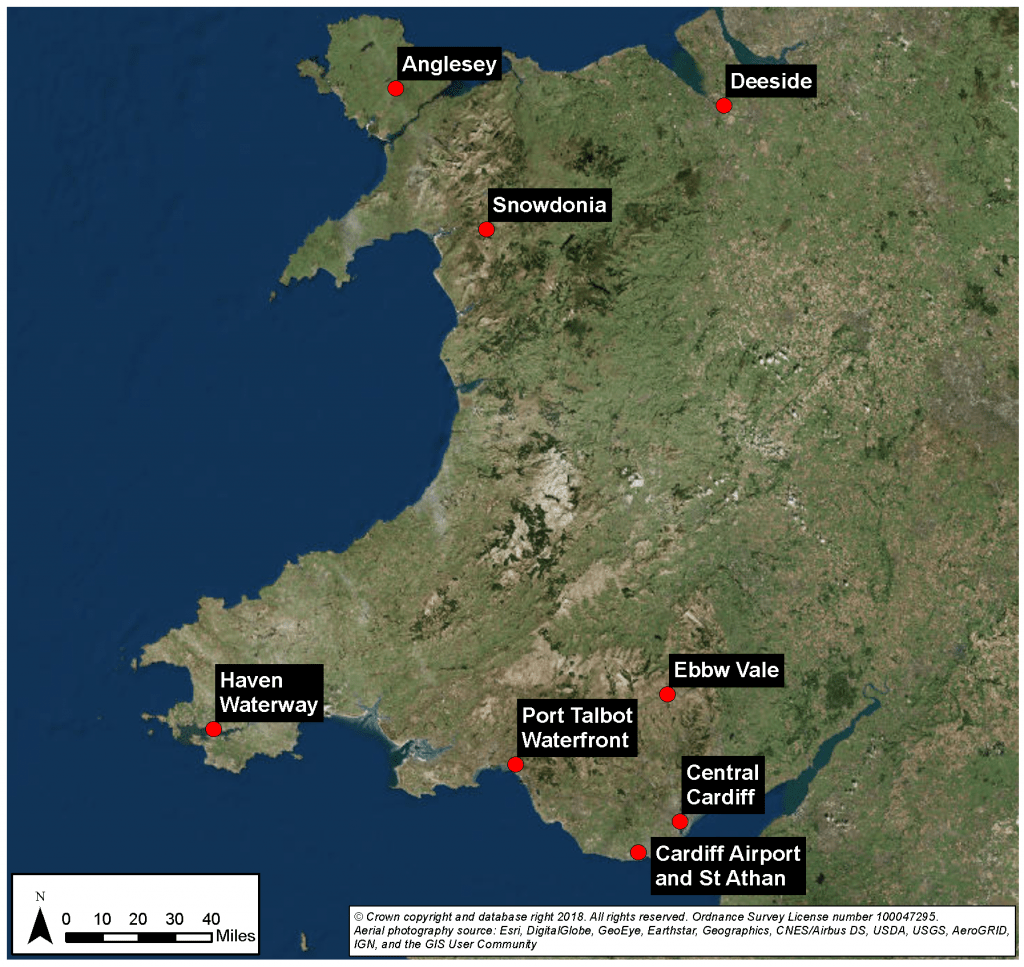In January and February of this year the Economy, Infrastructure and Skills (EIS) Committee undertook a short inquiry into Enterprise Zones in Wales. The Committee took evidence from six of the eight Enterprise Zones Board Chairs and from the Cabinet Secretary for Economy and Transport. Three Members of the Committee also travelled to Snowdonia and Anglesey to meet with the Chairs of those boards.
The Committee’s report makes ten recommendations to the Welsh Government – six of which were accepted outright, while four were accepted ‘in principle’.
The current Enterprise Zones policy in Wales began as a reaction to the UK Government’s March 2011 announcement of the creation of Enterprise Zones in England. The Welsh Government sought quickly to follow suit with the creation of seven Enterprise Zones in Wales by January 2012, all with a stated objective to create jobs and growth.
The zones chosen by the Welsh Government reflected a variety of approaches. Some, for instance Cardiff and Deeside, were chosen to exploit obvious economic strengths, while others, such as Anglesey and Snowdonia, were intended to address significant local challenges.
There is a legitimate question as to whether Enterprise Zones were actually needed in some of the areas selected by the Welsh Government, particularly in Cardiff where the Committee heard the zone was “pushing at an open door” in economic terms.
In contrast, the Committee heard from the Chair of the Snowdonia Enterprise Zone Board that the Board had realised very early on that, given the challenges faced in their zone, they were never likely to be able to deliver significant impacts in terms of growth or jobs, at least in the short to medium term. Instead, their focus shifted to exploring the opportunities for the long term development of the zone. The Committee heard that a number of other zones were also in a similar position.
The Committee felt that this change in focus for some of the zones was not widely communicated and, perhaps more importantly, was not reflected in the performance indicators published by the Welsh Government, initially at an all-Wales level. 
Transparency
The EIS Committee, following on from the work of the Finance Committee and the Enterprise and Business Committee of the Fourth Assembly, has been pushing for the Welsh Government to release detailed information on the performance of each zone in terms of job creation (the stated overall objective), along with detailed information on Welsh Government expenditure on each zone.
The Committee welcomed the Cabinet Secretary’s decision to release the most detailed information of this nature to date, albeit after the final evidence session. The Committee noted that it was ‘most unfortunate’ that it had taken until the end of the Committee’s inquiry to get to this point. The Committee’s report states further:
Over the last five or six years this has been a case study in how a drip-feed approach to the sharing of information with Assembly Members and Committees can prevent clear and objective scrutiny from taking place, while also creating the impression of under-performance and inefficiency.
It should not be this difficult, or take this long, for the Welsh Government to publish information that allows the performance and value for money of one of its flagship economic policies to be understood properly and scrutinised effectively. The Committee hopes that the Welsh Government takes this constructive criticism on board in the design and delivery of future policies.
The Committee believes that there is merit in a regional approach to economic development, and that a focus on supporting deprived areas is inherently a good thing and should continue. However, the Committee recommended that the Welsh Government should ensure that the aims of any future regional approaches to economic development are, for each individual region or local area: clear and realistic; sufficiently detailed to allow an understanding of the challenges faced; and accompanied by detailed, open, transparent and appropriate monitoring data. This recommendation (6), along with two others also aimed at increasing transparency and improving the availability of monitoring data (recommendations 3 and 5), were accepted ‘in principle’ by the Welsh Government. It remains to be seen how the Welsh Government will implement these recommendations in practice.
Overall conclusion
The Committee did not wish to appear critical of the good work of the Enterprise Zone Boards, and certainly recognised the commitment, drive and professional expertise of all involved. However, the Committee felt that, ‘on the whole, the Enterprise Zone concept has not proved itself to date in Wales’.
The evidence the Committee heard suggests that the zones which have achieved against the Welsh Government’s stated aims were those that were already in the best position to do so from the outset, and that the specific Enterprise Zone incentives played only a minor part in their success (for instance Cardiff Central and Deeside). Other zones, which were starting from a very different place in terms of the challenges they faced, found the incentives to be of some benefit. The Committee recognised the fact that these zones, such as Anglesey, Snowdonia and Ebbw Vale, are still very much on a journey and have been focused on putting the building blocks in place for the long term, with Snowdonia in particular yet to demonstrate significant successes against the Welsh Government’s own published indicators.
Overall the Committee concluded that the original aims of the Enterprise Zone policy, to create growth and jobs, have not been achieved across the board, and that these were probably unrealistic to begin with given the varying starting points of each of the Enterprise Zones.
Assembly Members will debate the Committee’s report, along with the Welsh Government’s response, in Plenary on Wednesday 9 July.
Article by Ben Stokes, National Assembly for Wales Research Service






